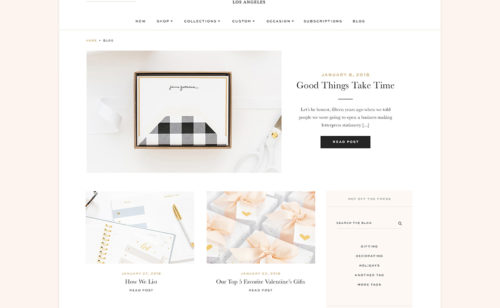
In today’s fast-paced digital landscape, where information is abundant and attention spans are dwindling, blogging continues to hold immense relevance for businesses seeking to make their mark. As content consumption reaches unprecedented heights, blogging stands as a powerful medium to captivate audiences, establish authority, and drive meaningful results.
Let’s delve into the key reasons why blogging remains not just relevant, but essential, in 2023.
Establishing thought leadership and expertise
Regularly writing posts for your blog (and guest posts for other peoples’ blogs) will showcase you as an authority on your subject, whatever it is. If your competitors don’t have a blog, and you’re continuously showing up with timely articles about trends, techniques, and news about your industry, you will have the edge and appear to be a leader in your niche.
Through the consistent creation and sharing of valuable content, blogging allows you to build trust among your audience. By sharing your expertise openly, you contribute to the collective knowledge within your industry and become a trusted source of information.
As your audience engages with your blog posts and recognizes the value you provide, they begin to trust your expertise and rely on your recommendations.
This positioning as a thought leader opens doors to various opportunities, such as speaking engagements, collaborations, media features, and partnerships, further solidifying your authority and expanding your reach.
Driving organic traffic
Driving organic traffic to your website is essential for long-term success. Search engine algorithms are becoming increasingly sophisticated and blogging serves as a powerful tool to optimize your website for search engine visibility and attract targeted traffic.
Search engines continue to prioritize high-quality, relevant content in their algorithms. By consistently publishing well-crafted blog posts, you provide search engines with fresh and valuable content to index. Frequent publication of content signals to search engines that your website is active and regularly updated, leading to improved organic rankings.
Blogging offers an effective way to optimize your website for search engine visibility. By strategically incorporating relevant keywords, optimizing meta tags, and generating backlinks, you can improve your website’s organic rankings and drive targeted traffic to your site.
Building a strong online presence
Blogging serves as a powerful tool to create a hub of valuable content that not only showcases your brand’s voice, values, and expertise but also fosters a deeper connection with your target audience. Through consistently publishing fresh and compelling blog posts, you can attract, engage, and retain a loyal audience, thereby strengthening your online presence and increasing brand recognition.
Blogging allows you to establish a digital footprint that reflects your brand’s identity and values. By consistently sharing well-crafted content that aligns with your brand’s messaging, tone, and purpose, you can create a cohesive online presence that resonates with your audience. This cohesive online presence across your blog and other digital channels cultivates familiarity and recognition, making it easier for your target audience to connect with and remember your brand.
The valuable content you provide through blogging showcases your expertise, knowledge, and insights. It positions you as a reliable source of information and solutions within your industry. By consistently delivering high-quality content that addresses your audience’s pain points, answers their questions, and offers practical advice, you establish trust and credibility. This trust is essential in building a strong online presence as it encourages repeat visits, referrals, and positive word-of-mouth.
Engaging and connecting with your audience
Blogging provides a direct means of communication with your audience. Through comments, social media shares, and email subscriptions, you can foster engagement, receive feedback, and build meaningful relationships with your readers. This interactive aspect of blogging allows for valuable two-way communication, fostering a sense of community and loyalty.
When you blog, you are giving your audience a platform to share their thoughts and opinions on your content. This can be a great way to get feedback on your work and to learn more about what your readers are interested in. Additionally, blogging can help you to build relationships with your readers. When you respond to comments and questions, you are showing your audience that you care about their feedback and that you are invested in building a community around your blog.
Blogging can also help you to attract new readers. When you share your blog posts on social media and through email subscriptions, you are exposing your work to a wider audience. This can help you to reach more people who are interested in the topics that you write about.
Generating leads and conversions
Well-crafted blog content has the potential to generate leads and drive conversions. By providing valuable information and addressing the pain points of your target audience, you can attract qualified leads who are more likely to engage with your products or services. Incorporating effective call-to-action (CTA) elements within your blog posts can guide readers toward taking the desired action, such as subscribing to a newsletter, making a purchase, or requesting a consultation.
If you’re interested in starting a blog for your business but don’t know where to begin, check out this helpful resource. This guide provides a comprehensive overview of the benefits of blogging for ecommerce businesses, as well as tips for getting started and creating content that resonates with your target audience.
Supporting social media and content marketing efforts
Blogs can serve as a valuable source of content for your social media and content marketing efforts. By sharing your blog posts on social media platforms, you can drive traffic to your website and expand your reach. This can help you attract new readers and potential customers, as well as build brand awareness and establish your authority in your industry.
In addition to sharing your blog posts on social media, you can also repurpose your blog content into other formats, such as infographics, videos, or podcasts. This can help you cater to different audience preferences and reach a wider audience. For example, you can turn a blog post into an infographic to share on social media or create a video that summarizes the key points of a blog post.
Repurposing your blog content in this way can also help you save time and resources. Rather than creating new content from scratch, you can leverage your existing blog content to create new assets that drive engagement and conversions.
Now that we’ve made our case for the relevance of blogging in 2023, let’s take a look at how to start!
Plan your content strategy
To ensure your blog is successful, it’s important to create an effective content strategy. This involves determining the types of content you will create, such as informative articles, how-to guides, industry news, or product reviews. By providing a mix of content that appeals to your target audience, you can keep them engaged and coming back for more. Brainstorm as many ideas as you can for blog posts and keep track of them somewhere. Bonus points for saving these in a project management tool, which will make it a breeze to move from idea to publication.
Planning a content calendar is also crucial for staying organized and on track with your blogging efforts. This can help you stay consistent with your posting frequency and ensure that you are covering a variety of topics that are relevant to your audience. If you need help creating an editorial calendar, check out this helpful guide which includes step-by-step instructions for planning out your blog content, including tips for brainstorming ideas, setting goals, and tracking your progress!
If you use Shopify for your ecommerce store, check out this post on how to make more sales with your Shopify blog. This guide provides actionable tips for optimizing your blog content to drive sales and boost your bottom line.
Choose the right blogging platform
Selecting the right blogging platform is essential to ensure a smooth and user-friendly experience for both you and your readers. WordPress is a popular blogging platform, but unless you need WordPress’ “power user” features, the Shopify blog should be just fine for most product-based businesses. Some of the great things about blogging on Shopify vs. WordPress are:
- Readers are on your shop site already, and it’s easier to keep them there.
- Your blog will be cohesive and look purposeful. It can be confusing for customers to feel like they’re on two different sites as they move between your shop and your blog.
- You only have one admin tool to use to update your site and blog.
If you already have an established blog and are deciding whether to migrate to a Shopify blog, be sure to check out this blog post: Should I Move My Huge Blog From WordPress to Shopify?
Sketch out an editorial calendar
An editorial calendar is a calendar with an idea for a post mapped out on each day that you want to post. You can use anything from a paper calendar to software designed for this purpose. For an ecommerce blog, you can use Shopify’s “future publishing” feature to plan out your posts. This means you can put those blog posts on your site now and set dates for each to automatically publish.
Write content for future posts before launching
It’s best to have yourself scheduled out many posts in advance so that if something comes up, you don’t find yourself missing a day. If you can find the time before you launch to write a month or two of blog posts, you’ll be so glad you did! Of course, you’ll want to keep up with them, so that every time you sit down to write a blog post, it’s for a future date on your calendar, and not something you’re scrambling to get up that same day.
For instance, maybe you’ve decided you will post twice a week, and you’re aiming to always have a month of posts ready to go at any time. That means you should have eight posts written and scheduled, and then set aside time regularly to add new posts. Then, if your business gets really busy, you decide to go on vacation, or a family emergency strikes, you’re all set and don’t need to scramble to keep caught up.
Don’t let this tip delay you, though. Having the blog out there and generating traffic is more important than being 100% prepared. At some point, you need to launch that thing, so don’t get too caught up in future post-hoarding. It will be nice to get some feedback from readers to help guide your planning.
Promote your blog posts
Here at Aeolidia, the way we like to think of our blog is as kind of a side door into our website. Of course, you’ll want people to be able to get to your blog from your home page, and even feature it there, but most of your marketing effort for the blog should be spent off of your site, trying to get other people to mention it on their sites and on social media.
You don’t want to interest your current customers in your blog so much as you want to use your blog to find brand-new customers, and then interest them in your shop.
Blogging can be a lot of work, and you don’t want to be up all night writing posts, gathering graphics, researching, and photographing to keep speaking to just a handful of people. Brainstorm some marketing ideas, such as pitching a story about your blog to other blogs in your niche, collaborating with other businesses, guest posting, advertising, hosting a giveaway, rewarding your customers for sharing the news with their friends, etc.
Measure and adjust
Once your blog is up and running, it’s crucial to monitor its performance and make adjustments as needed. Utilize analytics tools like Google Analytics to track key metrics such as traffic, engagement, and conversions. Analyzing this data will help you identify what’s working and what can be improved. Use these insights to refine your content strategy and continually enhance your blog’s effectiveness.
What if you don’t want to blog?
If you don’t want to have a blog, don’t worry! There are other things you can do to market your online shop if blogging is not for you. If you are less than enthused about managing a blog, be sure to check out: What to Do If You Don’t Want to Blog.

260 Blog Post Ideas for E-Commerce Businesses
If blogging does sound fun and you’d like to dive in, be sure to grab our free resource: 260 blog post ideas. The content ideas in this guide will work for your newsletter or Instagram, too! We’ll introduce you to 9 ecommerce blogs that are absolutely killing it, and give you an action plan for generating more ideas of your own and getting started.
Get your 260 blog post ideas PDF here:
Browse Posts
Newsletter Sign Up
We write a new email each week to help you grow your business.
Related Posts
Let's take your online shop to the next level
The Shopify websites we design have a reputation for substantial improvements to ecommerce conversion rates and online sales. Let's talk!
 Grab my guide to the 10 main ways to grow traffic and optimize to boost sales.
Grab my guide to the 10 main ways to grow traffic and optimize to boost sales.

